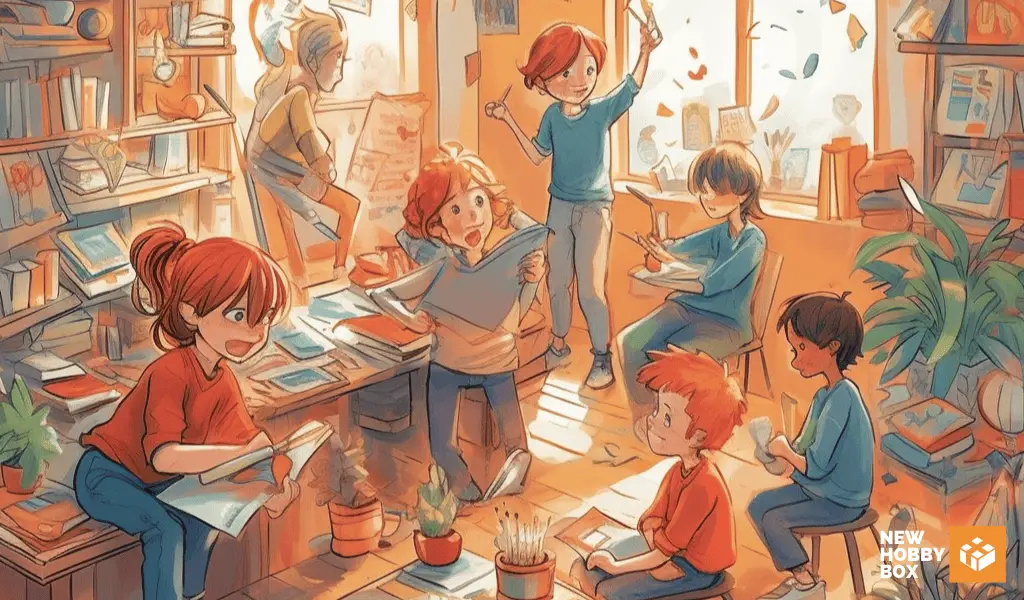
Ever been stumped, wondering, “What’s the perfect hobby for my kid?” As you know, it’s not just about keeping them busy – it’s about unlocking doors to self-discovery, skill-building, and plain old fun! Those are pretty high stakes if you ask us. But, with a world of possibilities, where do you start to answer the question, “How do I choose a hobby for my kid?”
Choosing a hobby for your child starts by considering their interests and abilities. Take note of what fascinates them, and match it to age-appropriate activities. This approach fosters personal growth while also ensuring that they enjoy their new hobby.
Like all things related to being a parent, there’s more to it than just that. As parents to a young child, we’re already asking this question and surfing through Montessori instruction manuals to help guide us – so we get how complex this can be. From our research, we’ve culled this process of helping your kid discover and explore a hobby they’ll love into 8 simple steps. Read on to get the play-by-play guide.
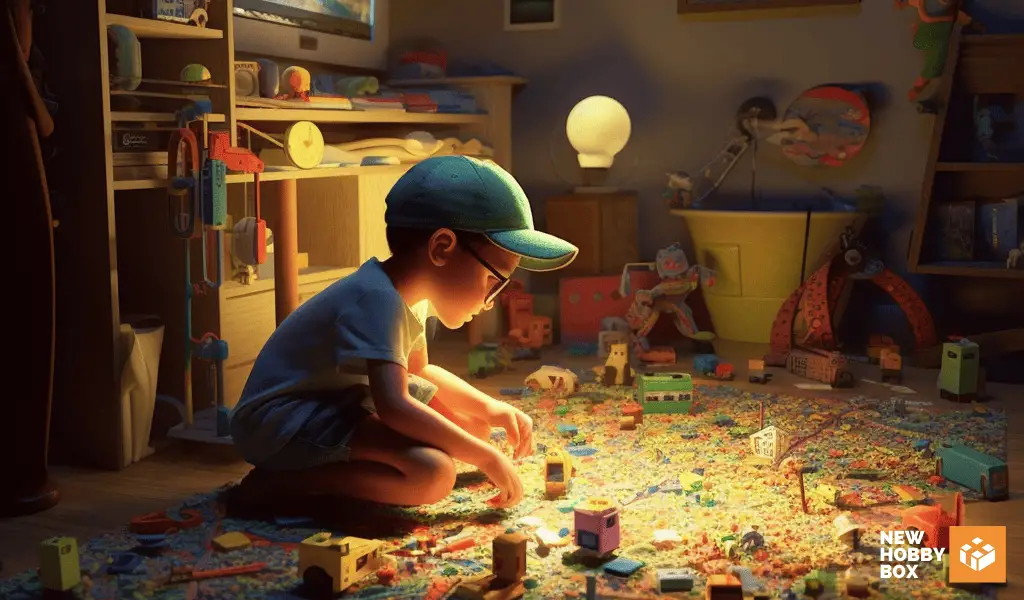
WHY HOBBIES MATTER FOR CHILDREN
Did you ever wonder why your child’s interest in seemingly random activities, like collecting stickers or building sandcastles, could be more than just fun and games? Hobbies, whether they’re creative, physical, or intellectual, aren’t just a source of entertainment for children. They hold the power to shape their futures, mold their personalities, and even define their place in the world. Intriguing, right? Now let’s dig into the reasons why hobbies matter so much for our young ones.
- Relaxation: Hobbies offer children an escape from daily stresses, acting as a personal sanctuary for decompression and relaxation. Through activities they love, children can forget their worries and recharge their minds.
- Talent Discovery: Hobbies serve as a treasure chest of hidden skills and interests for children. Engaging in different hobbies can reveal innate talents, potentially shaping their academic and career choices in the future.
- Interpersonal Skill Development: Hobbies, particularly team-based ones, play a key role in honing a child’s interpersonal skills. From communication to negotiation, hobbies can help them master valuable life skills, molding them into confident social beings – not that we need our kids to be master negotiators while living under our rooves…
- Personal Identity Formation: Hobbies contribute to children’s personal identity formation. Whether they’re known as “the artist” or “the coder,” hobbies help children carve their unique identities, setting them apart in their distinct ways.
- Self-Esteem and Confidence Building: Hobbies can serve as self-esteem boosters. Each achievement, no matter how small, contributes to their self-belief and confidence, encouraging them to face challenges with an optimistic outlook.
- Sense of Accomplishment: Hobbies provide children with a sense of accomplishment. Overcoming challenges and achieving milestones in their hobby journey not only fuels their passion but also empowers them with a ‘can-do’ attitude towards life’s challenges.
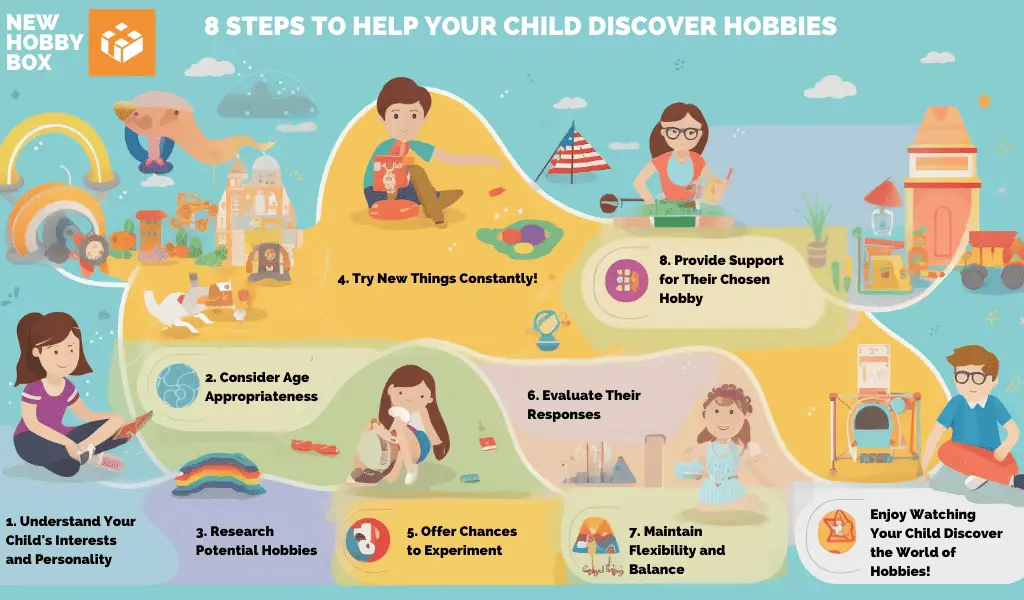
8 STEPS TO HELP YOUR CHILD DISCOVER A HOBBY THEY’LL LOVE
In essence, hobbies are not just ‘time-fillers’; they are ‘future builders’ for your child. No pressure, right? Don’t stress though, simply read on and learn 8 tried and true steps that will help you add some structure to helping your child find extracurricular fulfillment. Now then, are you ready to guide your child in their exciting hobby journey?
1. Understand Your Child’s Interests and Personality
Ever wished you could read your child’s mind? Well, you may not have telepathy, but open discussions could be your superpower. Open a dialogue with your little one about their likes and dislikes, their dreams, and fears. You might be surprised to find what they truly love, and gain better insight into their unique personality traits and preferences.
Aside from discussion, what do you observe? Are they always doodling in the margins of their notebooks or building Lego towers taller than your dog? These could be early signs of a budding artist or architect.
Does your child have a knack for problem-solving? Chess or coding could be the perfect fit! A keen eye for color coordination? Painting or photography might just strike a chord.
Recognizing and nurturing these interests now could pave the way for a lifelong passion. This is a great time to grab your journal and start jotting down some of the interests your seeing. It can even serve as a physical tool for discussing what your child is into with them.
WHAT ACTIVITIES DO YOU SHARE WITH YOUR CHILD?
Activities to share with your child include reading books, gardening, or playing sports. Reading enhances literacy skills, gardening teaches patience and responsibility, and sports encourage a healthy, active lifestyle.
This can be another great starting point in uncovering what your child is into. The key though is to make sure you aren’t making the experience about you, and more about their discovery.
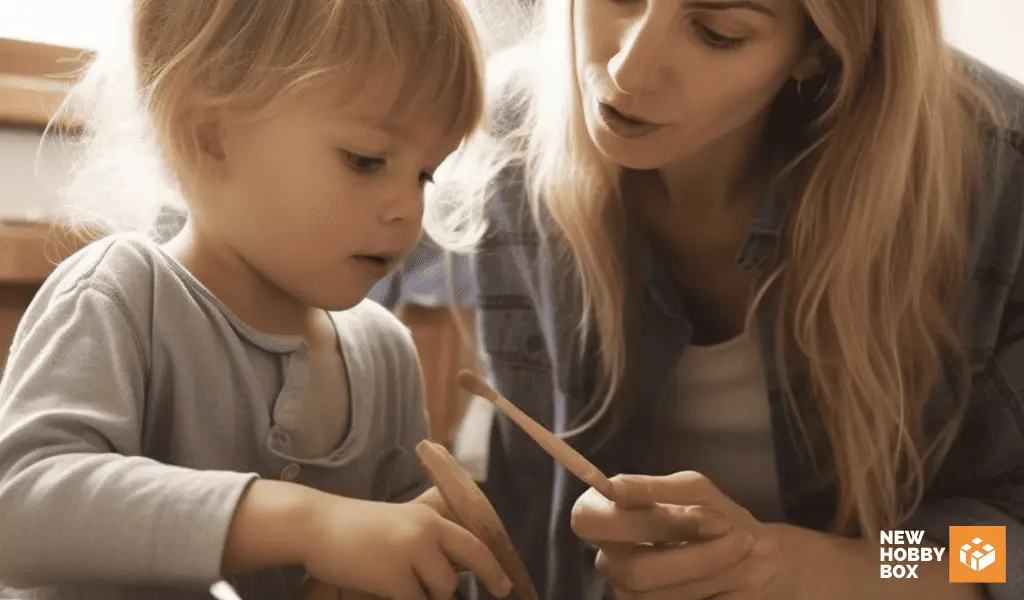
2. Consider Age Appropriateness
Consider this step your golden rule to finding a hobby for your children – Always consider the age and developmental level of your child. It’s like buying clothes, you wouldn’t get an oversized shirt and expect it to fit perfectly when you get home, would you?
The same principle applies here, you wouldn’t want to introduce a complex hobby like coding to a three-year-old and expect them to dive right in. Keep in mind that their cognitive abilities and motor skills are growing and changing every day, and the hobby should be a vehicle for this growth, not a stumbling block.
Piggybacking on the concept of trying hobbies that both you and your child share or that you personally love, let’s play out a scenario quickly. You love painting, and you want to share this joy with your little one – that’s fantastic. However, asking a 4-year-old to paint Monet’s Water Lilies might be a smidge too ambitious. On the other hand, finger painting or simple watercolors? That’s a way better fit.
Introduce them to the colors, and let them explore their creativity in a simple and fun way. As they grow, you can then introduce more complex techniques, keeping their interest piqued while gradually building their skills. Hands down, this is the best way to explore and grow their interest in a hobby.
KEEP IT SIMPLE
Don’t forget – the magic of discovery lies in simplicity. Hobbies should light up their curiosity, not douse it with complexity. You don’t want to overwhelm them. The aim is to create an atmosphere where learning is as natural as play. So next time you’re thinking about a new hobby, ask yourself, is it age-appropriate? If yes, then you’re already halfway there.
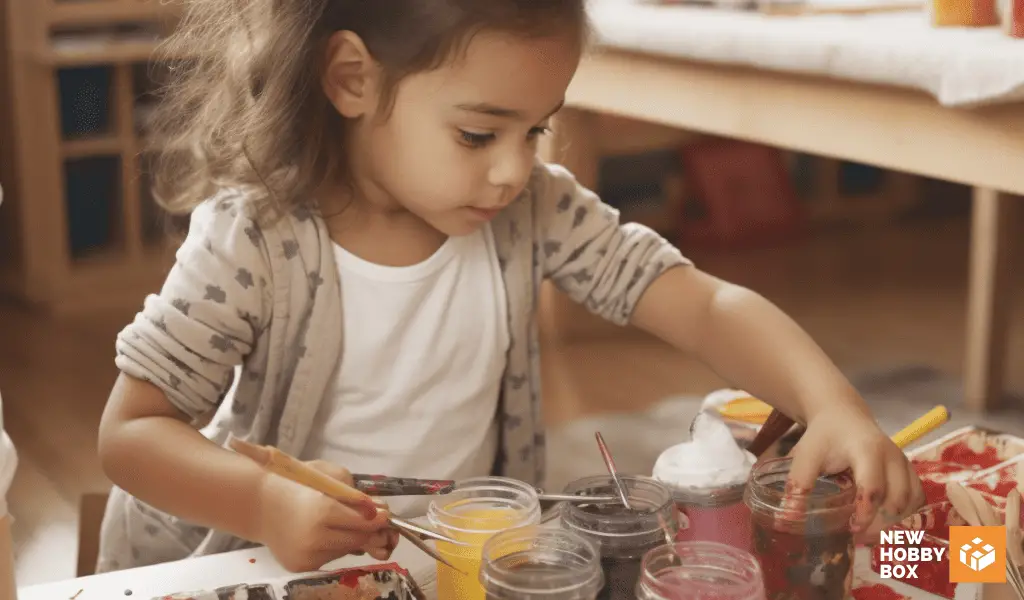
3. Research Potential Hobbies
You’ve sized up your child’s interests, their personality is no secret, and you’ve got their age level figured out – now what? The quest begins. Start exploring potential hobbies that fit the bill.
The digital age has made this easier than ever before; a quick Google search can serve up hundreds of options. But don’t forget the charm of local clubs, hobby classes, and community events – who knows, the perfect hobby might just be waiting at your neighborhood pottery class.
But here’s something to chew on: hobbies aren’t invisible. They need space, both physically and time-wise. Whether it’s soccer practice in the backyard or violin lessons in the living room, be ready to provide a nurturing environment for your child’s new pursuit.
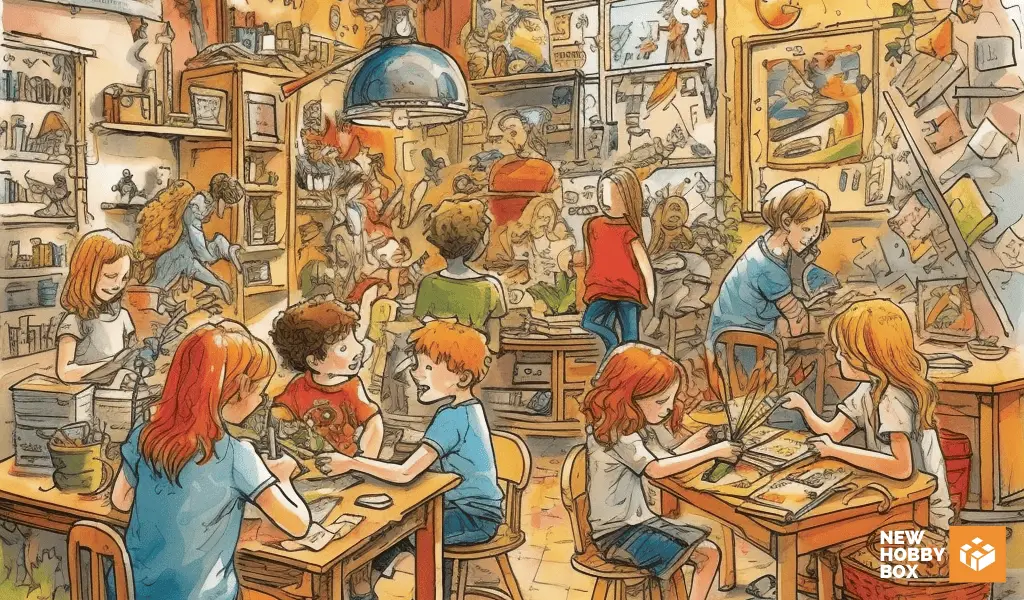
4. Try New Things Constantly
Remember the thrill of riding a bike for the first time – the place and feeling are so real in our minds that it’s like it just happened. It’s this type of experience that is a stepping stone to finding a hobby that might just stick. In many ways, it’s like taking your child to a Las Vegas buffet and letting them sample different flavors before they find their favorite dish. So, how do you keep the buffet of experiences interesting? Easy – Mix it up!
One day, a backyard astronomy activity like building a telescope together might open up their world to the stars. On another day, a trip to the local museum could stir up an interest in history. Even a simple gardening activity at home could blossom into a love for nature.
The key is to keep introducing new things, expanding their horizons, and tickling their curiosity. Make it a habit to seek and try new activities together. It not only helps them discover their interests but also creates beautiful memories and a powerful bond.
5. Offer Opportunities to Experiment
Encourage your child to experiment with a variety of activities. The process of trying different things will not only keep their curiosity alive but also prevent them from feeling stuck in a hobby they’ve outgrown or no longer enjoy.
After all, hobbies are meant to be fun, not a long-term contract. So before your kiddo dives headfirst into something, let them dip their toes in first.
And where can you find these ‘hobby samples’? Look no further than your child’s school or daycare. School clubs and activities are often a gold mine of opportunities, from sports and music to arts and science. Another great resource is organizations that offer trial classes. It’s a chance for your child to test the waters and see if it’s a splash or a wash.
So, give your child the green light to experiment. It could be the first step towards them discovering a hobby they truly love and perhaps, a passion that could shape their future. After all, in the words of Thomas Edison, “I have not failed. I’ve just found 10,000 ways that won’t work.” Let’s embrace that spirit of experimentation and make discovering a new hobby an exciting journey.
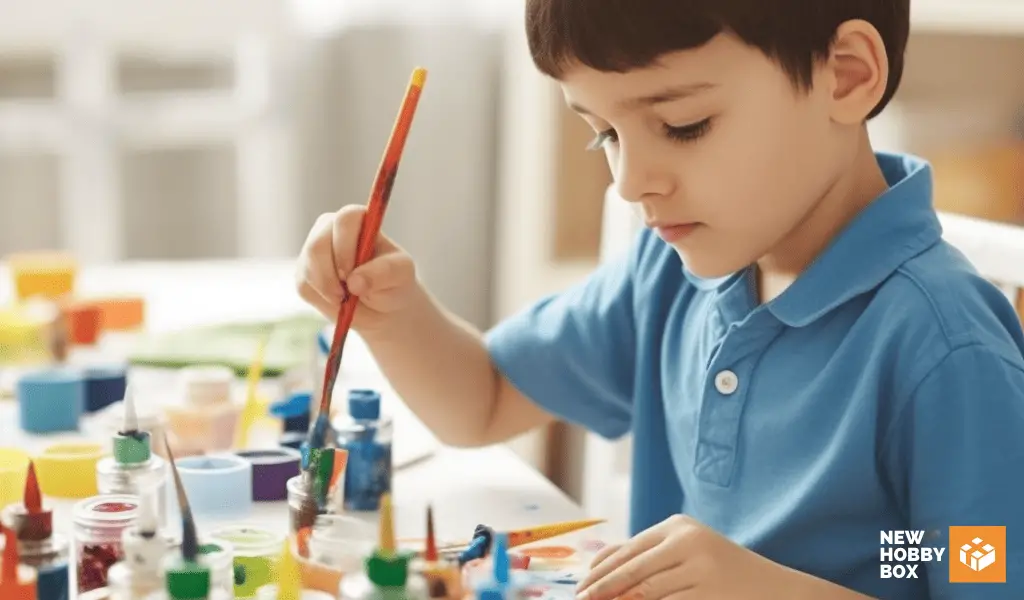
6. Evaluate Their Responses
Let’s face it, children are not miniature adults. Their interests are as fleeting as a Snapchat message (or Tik Tok… We’re not entirely sure what’s popular in that arena these days). Today it’s dinosaurs, tomorrow it could be outer space. And guess what? That’s completely okay. The evolution of interests is a natural part of their growth. The key is to recognize when it’s time to turn the page and explore a new chapter.
This is sort of your detective stage of the entire process. Your mission is to observe and evaluate your child’s reactions to different hobbies. Do their eyes light up when they strum a guitar? Or maybe their face breaks into a smile when they score a goal in soccer? These little clues can help you gauge whether a hobby truly excites them or if it’s time to keep searching.
At the end of the day, you’re the supporting actor, not the director of their life story. Respect their individuality and preferences. If they want to trade their ballet shoes for a soccer ball, be their cheerleader. Listening is an art that’s more potent than speaking.
Take cues from your child, understand their likes and dislikes, and adjust your approach accordingly. You’re not trying to help them simply find a hobby, but to encourage a love for learning, creativity, and self-expression. So keep observing, keep listening, and keep encouraging.
7. Provide Support for Their Chosen Hobby
Your role doesn’t end at merely providing. A hobby might start as a spark, but your encouragement can turn it into a roaring flame. Be involved, show interest, and provide moral support. Remember, you’re the co-pilot in this exciting journey of discovery, helping navigate your child to a hobby they truly enjoy.
After the initial eureka moment, your child might need resources to dive deeper into their newfound passion. Maybe it’s a set of paints for a budding artist, or dance shoes for a future prima ballerina. Or perhaps it’s your time and commitment to drive them to their soccer practices or piano lessons.
Offering guidance is like holding a torch in a dark tunnel. You’re there to illuminate the way, to help them overcome obstacles, and to cheer them on. Brainstorm ideas together, help them set goals, or take the next steps, be it enrolling in a class or setting up a dedicated space at home for their hobby.
In a nutshell, your role as a parent is a combination of cheerleader, guide, supporting actor, pilot, provider, etc. You’re in a lucky role where you get to witness the magic unfold. It’s an exciting position to be in.
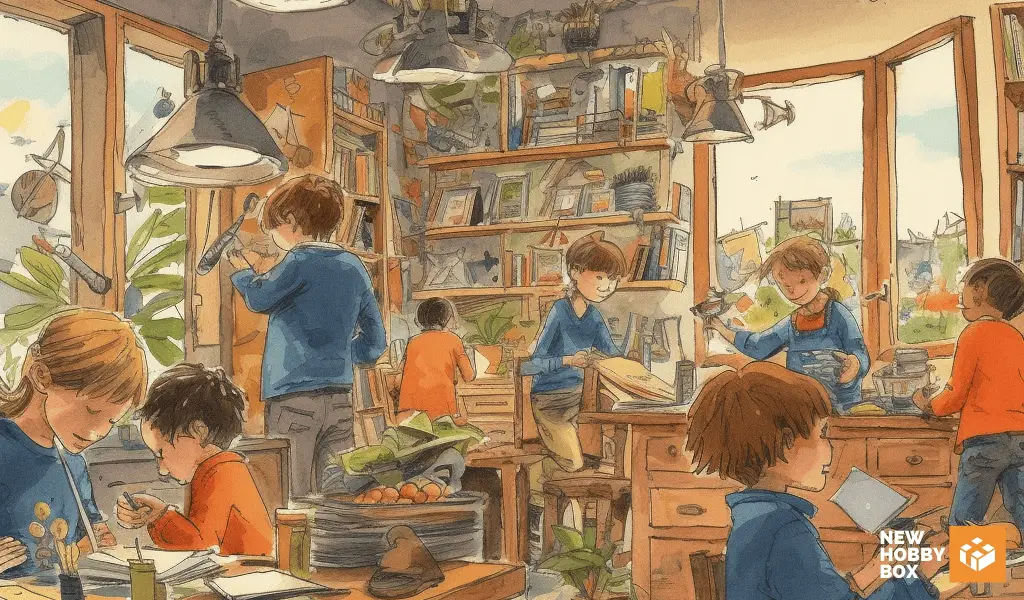
8. Maintain Flexibility and Balance
While we’ve already hit on the idea of flexibility, it bears repeating, because if there’s one thing we know about children, it’s that their interests can change faster than a chameleon on a disco ball. A child’s mind is a playground of curiosity. Embrace their evolving interests and be open to changes in hobbies. Who knows, their love for baking today might evolve into a passion for culinary arts tomorrow!
While hobbies are a great way for your child to learn and grow, it’s essential not to lose sight of balance. A balanced approach ensures your child reaps the benefits of a hobby without missing out on other important experiences.
So go on, maintain that flexibility and balance. After all, it’s not just about discovering a hobby; it’s about nurturing a well-rounded individual who knows how to enjoy life in all its colorful aspects.
BE THE BEST CO-PILOT AND ENJOY THE JOURNEY
In our whirlwind journey of uncovering the perfect hobby for your child, we’ve unlocked several secrets. From understanding their age and development, to researching potential hobbies, and encouraging regular exposure to new experiences, we’ve discussed how important it is to guide your child’s hobby exploration. Observing your child’s reactions can help you gauge their genuine interests and signal when it’s time to explore new territories.
Once the hobby has been chosen, it’s all about providing the necessary support. Be it resources, moral support, or guidance, your role as a parent is crucial in fueling their passion. But remember, maintain flexibility and balance. Be open to your child’s evolving interests and ensure their hobby complements, not overtakes, other critical aspects of their life.
If you’re looking for some ideas, be sure to check out our top 15 family-friendly hobbies that don’t suck – they’re great for the initial stages of sussing out the right path for your little one.
Finding a hobby is more than just a fun pastime. It’s a journey of self-discovery, learning, and growth. So let’s embrace this adventure together and ignite the spark of curiosity and passion in our children. Because who knows, the hobby they pick up today might just be the stepping stone to their dream career tomorrow. The joy is in the journey, after all!
